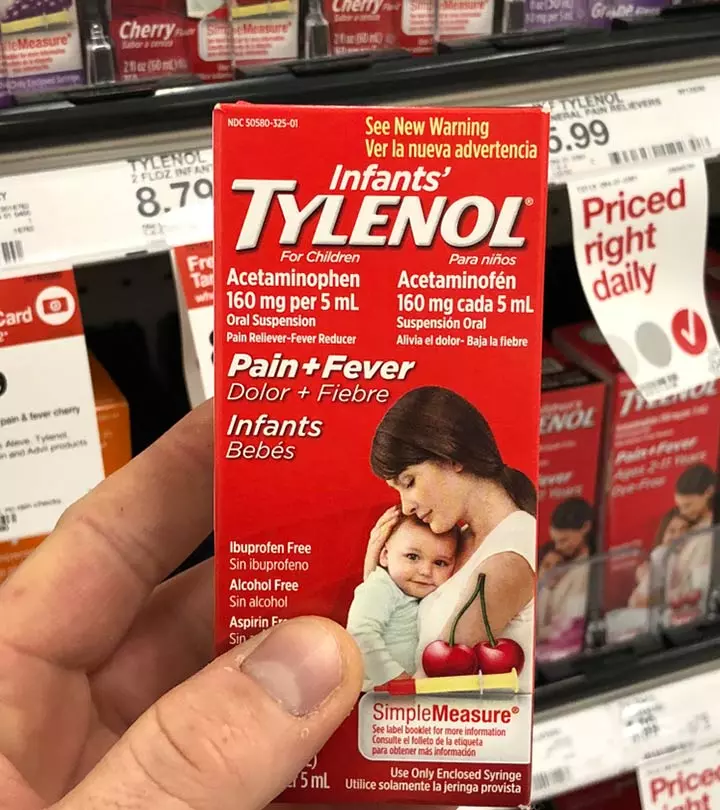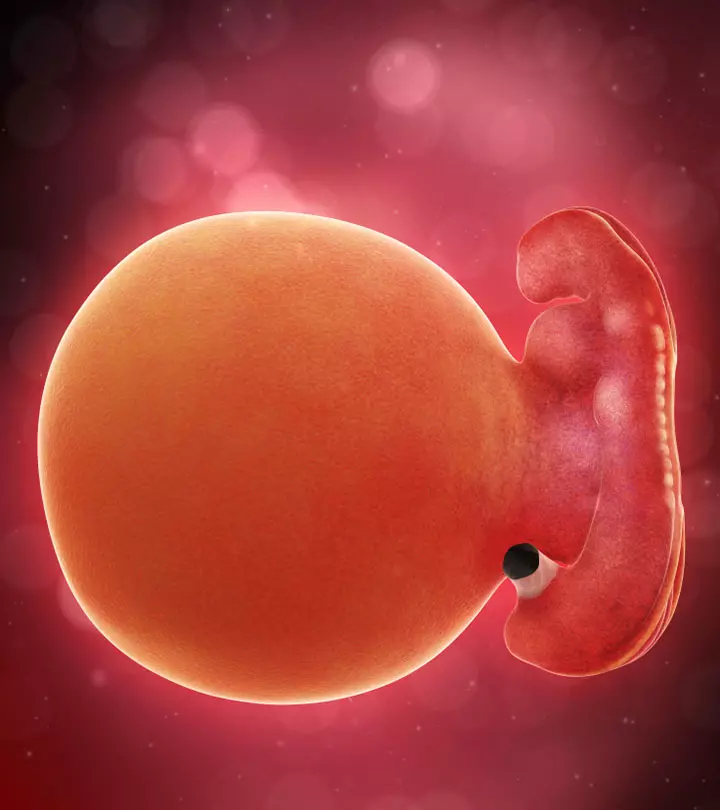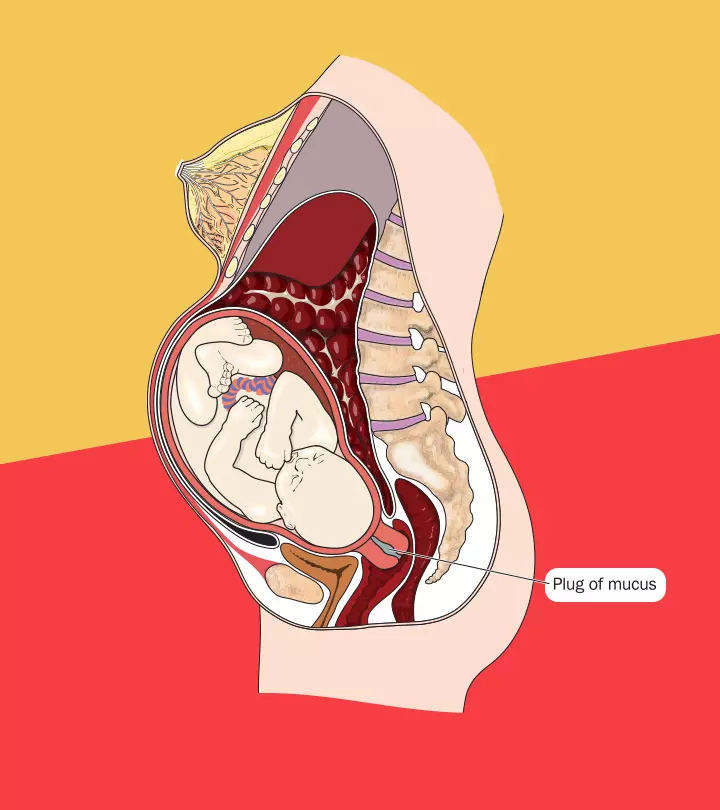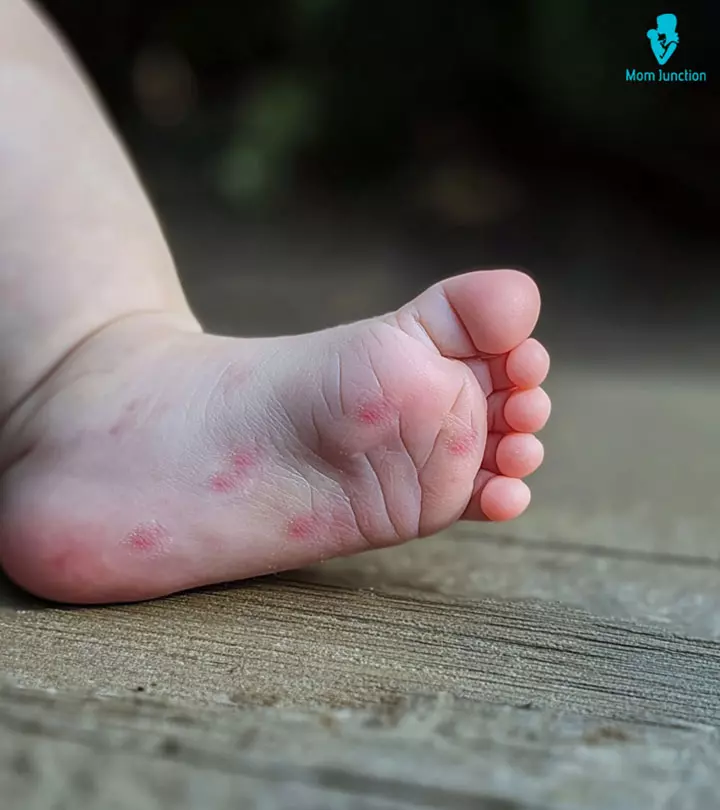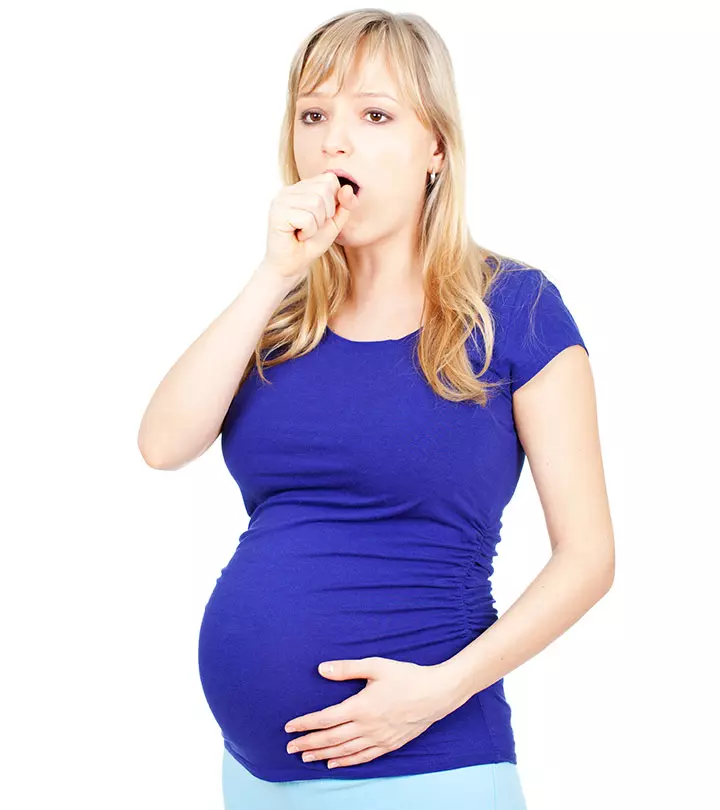
Image: Shutterstock
A dry cough during pregnancy may make you feel extremely uncomfortable. It is advisable that pregnant women should not take any over-the-counter (OTC) medication without consulting a doctor. However, you may try out a few home remedies for a day or two. If you are an expecting mother suffering from a dry cough, continue reading this post as we suggest ways to help you with the condition.

Key Pointers
- Dry cough is commonly experienced by pregnant women.
- Causes of dry cough among pregnant women may include changes in allergies, low immunity, asthma, and other factors.
- Pregnant women should avoid taking random over-the-counter medications that can worsen their condition.
- Some effective home remedies for pregnant women with dry cough include eating raw garlic, drinking ginger tea, and drinking chamomile tea with honey added to it.
What Is A Dry Cough?

A dry cough is a non-productive cough that does not produce phlegmiThick mucus produced in the chest, especially during cold or mucus. It is irritating and is mostly associated with a tickling sensation in the throat. It is often caused by viral infections of the respiratory system such as the cold and flu, and sometimes due to throat irritantsiChemicals that can harm skin, eye, or airway after a brief exposure and allergies.. A persistent dry cough relates to the presence of irritants and microbes in the air passages (1) (2).
Causes Of A Dry Cough During Pregnancy
There may be several causes of a dry cough in pregnancy, including the following:
- Allergies: They cause a dry cough. If you experience any allergy, exposure to the allergen may create irritation in the air passages, causing a dry cough (3).
- Low immunity: The immune system weakens during pregnancy and could make you prone to various infections and allergies that could cause a dry cough (4).
- Asthma: If you are already diagnosed with asthma before pregnancy, you are likely to experience breathing difficulties and dry cough during pregnancy (5).

- Hay fever or allergic rhinitisiAn allergic reaction that results in itching, sneezing, runny nose, and nasal congestion : It is an inflammation and irritation of the mucous membraneiThe moist inner lining of several organs and bodily cavities inside the nose, caused by hypersensitivityiExcessive or improper immunological reactions to an antigen or allergy . High estrogeniA sex hormone associated with the female body. levels in the body might aggravate this condition, prompting a dry cough (6).
- HeartburniA sharp, excruciating burning sensation below or behind the breastbone : If the acidic contents enter into the respiratory tract, it could lead to inflammation of the respiratory tract lining, causing a dry cough (7).
- Viral infections: Common cold or flu that are a result of viral infections are likely to cause an upper respiratory tract infection such as dry cough (8).
- Air pollutants: Exposure to air pollutants, such as smog, irritant gas, or tobacco smoke, that irritate the back of the throat may cause a dry cough.
Signs And Symptoms Of A Dry Cough While Pregnant
The following are the signs and symptoms that might develop with a dry cough.
- Blocked throat or a wheezing cough
- Coughing accompanied by nausea
- Sleeping difficulties
“Depending on the underlying cause, dry cough may last for anytime between one and three weeks during pregnancy
,” says Mya Bellinger, a qualified Medical practitioner specializing in internal medicine, immunology, and gynecology.
Are There Any Ways To Prevent A Dry Cough During Pregnancy?
The following tips could help when you have dry cough:
- The Centres for Disease Control and Prevention discovered that 29.9% of women have seasonal allergies. It is advisable to avoid common allergens such as grass, tree pollen, and animal fur to reduce the impact of these allergies.
- Reduce the probability of acid reflux by improving meal frequency and sitting upright after a meal.
- Adopt ways to boost up the body’s resistance
- Avoiding exposure to the poor quality of air
- Placing a humidifieriA device that increases the amount of water vapor in the air in the room might reduce nasal congestion
- Prop your head using a couple of pillows for easy breathing
- Maintain good hand hygiene and avoid allergens
 Experts say
Experts say
Relief Measures For Dry Cough During Pregnancy
If the dry cough has just started and is mild, you may try the following measures. Although they might not cure the cough completely, they may provide temporary relief.
- Stay hydrated by increasing your fluid intake. Dehydration could worsen your condition and even suppress immunity.
- Keep your head and upper body in an elevated position while lying down to prevent sleep difficulties due to a cough.
- Lukewarm water with freshly squeezed lemon juice might soothe the throat irritation and alkalize the body.
- Warm water, soups, and teas mixed with a teaspoon of honey could treat cough and cold as honey holds antiseptic properties.

- Gargling with a warm saline solution might be effective in getting rid of a dry cough.
Do Home Remedies For Dry Cough Work?
People try some age-old natural remedies for treating coughs. But there is little or no scientific evidence to support their effectiveness. Most of them are harmless, so you may want to try after talking to your doctor.
- Eating raw garlic, along with your food might be effective in alleviating the dry cough.
- Ginger tea made of fresh root may soothe the throat and prevent irritation that might cause a cough.
- Chamomile tea in pregnancy, with some honey added to it, may also help.
- Add a pinch of black pepper powder on a slice of lemon and suck it. It is believed to reduce the symptoms of a cough.
- Make a natural dry cough syrup by mixing onion juice with honey and drinking the mixture.
- A paste of basil leaves and honey might help.
- Orange juice boosts your immunity and could help in relieving the symptoms.
- Saltwater gargle will help soothe the throat and alleviate the cough. Make sure you are not swallowing the salt water.
- Turmeric is believed to have anti-inflammatory and anti-microbial properties. Add a pinch into warm milk or food and incorporate it into the pregnancy diet.
- Consider using apple cider vinegar diluted in water, as it helps relieve a dry cough.
Note that there are no studies to support these claims. They are based on popular beliefs. While home remedies can provide temporary relief, they shouldn’t replace professional medical advice or treatment. Always talk to your healthcare provider about any concerns to ensure these remedies are safe for you and your baby.
When To See A Doctor?
Although a dry cough is harmless, you should consult your doctor if you have persistent dry cough along with any of these symptoms:
- Cold
- Prolonged appetite loss
- Frequent episodes of insomnia for an extended period
- Coughing along with severe chest pain
- Fever of 102°F and above
- Persistent dry cough
“For uncomplicated cases, pain during a cough may be associated with round ligament pain. If you have an infection or bleeding in the uterus, you will have more pain with coughing and tenderness to touch,”
says Dr. Alan Lindemann.
It is better to visit your doctor if these symptoms persist and do not fade away even with home remedies.
Dry Cough Treatment During Pregnancy
Your doctor is likely to recommend the below medicines depending on the severity of the dry cough.
- Anesthetic sore throat lozenges (ease throat pain)
- Dextromethorphan with guaifenesin cough drops during pregnancy (suppress a dry cough) (9)
- Hepatitis B and flu vaccinations are also recommended to prevent complications in the baby (10).
- Tdap vaccine is suggested for whooping cough (11). The doctor may also suggest you see a physician if the cough does not get better with these medicines or is accompanied by a fever, or if any other illness is suspected.
 Point to consider
Point to considerWill A Dry Cough Affect The Baby During Pregnancy?
A dry cough may not affect the baby as the placenta serves as a barrier and offers enough protection to the growing fetus.
But if a cough, cold or flu is not treated for a long time, the infection might spread internally and affect the cognitive development of the baby and impair childbirth. Therefore, do not ignore the symptoms associated with excessive coughing during pregnancy and get them checked by a doctor soon.
Does Dry Cough During Pregnancy Cause Any Complications?
In the later stages of pregnancy, dry cough is likely to cause certain complications.
- Disrupted sleep patterns are common, and coughing episodes associated with lack of sleep could make the body weak and fragile.
- Urinary incontinence is common during pregnancy when the uterus puts excessive pressure on the bladder. It might become severe with a dry cough, sometimes causing urine leakage.

- Suppressed immunity due to a dry cough could highly increase the risk of various infections.
- Reduced appetite associated with dry coughing might lead to nutritional deficiencies.
- It may also cause physical, emotional, and mental stress.
Obstetrician and maternal mortality expert Dr. Lindemann clarifies, “If your cervix is closed, coughing cannot cause a miscarriage. However, if your cervix is thin and 4-5 cm dilated, a cough could initiate the delivery of a placenta, sac, and baby.”
Frequently Asked Questions
1. How does a dry cough differ from a wet cough during pregnancy?
A wet cough is a productive cough that brings mucus or phlegm into the throat or oral cavity, while a dry cough is a non-productive cough (13).
2. Can stress trigger a dry cough during pregnancy?
Stress cannot directly influence the onset of a cough. However, it may induce a common cold or rhinitis, which may result in the onset of dry cough (14).
3. Can hormonal changes during pregnancy contribute to a dry cough?
Pregnancy induces hormonal fluctuations that enhance blood circulation in the respiratory system and increase sensitivity to irritants (15). This, along with acid reflux and nasal congestion, can manifest as a dry cough. Seeking guidance from a healthcare expert is advised for appropriate evaluation and management.
4. Are there any prenatal vitamins or supplements that can help strengthen the immune system and reduce the risk of a dry cough?
There is no evidence to support the claim that prenatal vitamins or supplements enhance immune function or reduce the likelihood of a dry cough. However, it is widely acknowledged that adequate nourishment, including prenatal vitamins and supplements, is vital for a healthy pregnancy (16).
Dry cough in pregnancy may occur due to various reasons ranging from allergies to viral infections. While dry cough does not often pose a serious threat to pregnancy, it is important to find out the exact cause and work on managing the symptoms accordingly. Avoid any OTC cough medicine without your ob/gyn’s consent. However, you may try some of the home remedies mentioned if your doctor permits. In addition, staying hydrated, resting, and sipping on warm beverages may help you feel better.
Infographic: Is Over-The-Counter Cough Medication Safe During Pregnancy?
Not all cough medications are safe to use in pregnancy. You may read the labels before using any OTC cough remedies to ensure that it is not contraindicated during pregnancy. However, asking your doctor for a prescription is recommended to take the right medication in the required doses and duration. Go through the infographic to learn more about over-the-counter cough medications during pregnancy. Illustration: Momjunction Design Team
Illustration: Dry Cough During Pregnancy: Causes Symptoms & Home Remedies
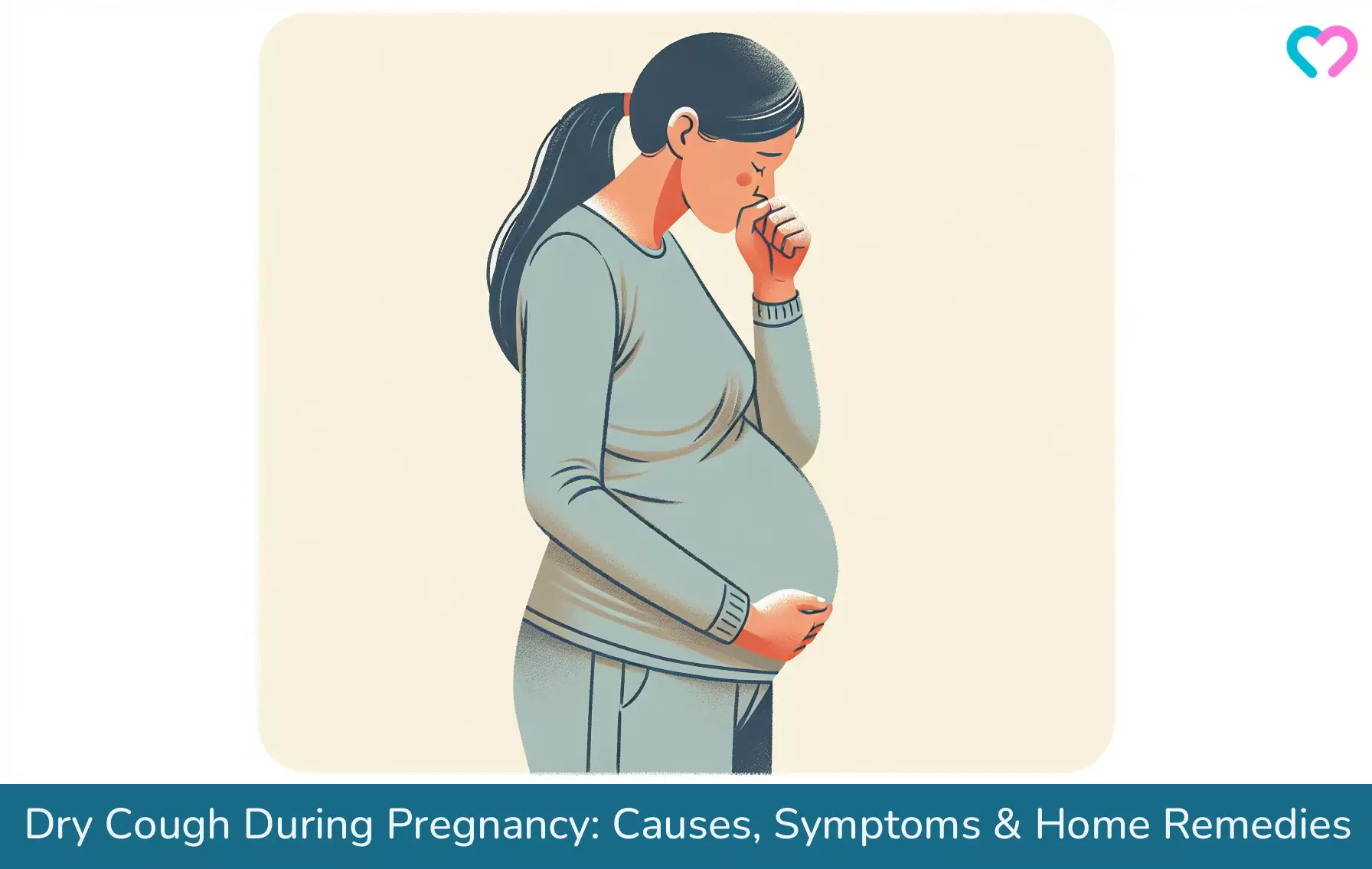
Image: Dall·E/MomJunction Design Team
Dry cough during pregnancy may be mildly uncomfortable to deal with during pregnancy. Learn how to treat it safely with this video.
References
1. Cough; Lawrence University
2. Cough; U.S. Department of Health and Human Services National Institutes of Health (2019)
3. Allergies (Seasonal); The University of Texas at Austin (2018)
4. Influenza; The Regents of the University of California
5.Magdalena Ciebiera & Iwona Szymusik; Unexpected Cause Of Chronic Cough In A Pregnant Woman; MEDtube Science (2017)
6. Mauricio Danckers; Cough; Chest Foundation (2018)
7. GERD or Acid Reflux or Heartburn Overview; Cleveland Clinic
8. Vanessa R. Laibl et al.; Influenza and Pneumonia in Pregnancy; Clinics In Perinatology (2005)
9. Robyn Horsager-Boehrer; Which over-the-counter cold medications are safe during pregnancy; The University of Texas Southwestern Medical Center (2018)
10. Can I have vaccinations if I’m pregnant; NHS (2018)
11. Tdap Vaccination for Pregnant Women; Centers for Disease Control and Prevention
12. Cough and Cold During Pregnancy; American Pregnancy Association
13. Cough; Cleveland clinic
14. Common cold; Mount sinai
15. Simon Couillard et al.; Asthma in pregnancy: An update; NCBI (2025)
16. How to stay healthy during pregnancy; NIH MedlinePlus Magazine
Community Experiences
Join the conversation and become a part of our nurturing community! Share your stories, experiences, and insights to connect with fellow parents.
Read full bio of Dr. Sangeeta Agrawal
- Dr. Alan Lindemann is an obstetrician and maternal mortality expert, who worked as a clinical associate professor at the University of ND. An alumnus of the University of ND and the University of Minnesota, he is a member of the American College of Obstetricians and Gynecologists and the American Medical Association.
 Dr. Alan Lindemann is an obstetrician and maternal mortality expert, who worked as a clinical associate professor at the University of ND. An alumnus of the University of ND and the University of Minnesota, he is a member of the American College of Obstetricians and Gynecologists and the American Medical Association.
Dr. Alan Lindemann is an obstetrician and maternal mortality expert, who worked as a clinical associate professor at the University of ND. An alumnus of the University of ND and the University of Minnesota, he is a member of the American College of Obstetricians and Gynecologists and the American Medical Association.
Read full bio of Rebecca Malachi
Read full bio of Dr. Ritika Shah
Read full bio of Reshmi Das

 Quick tip
Quick tip









